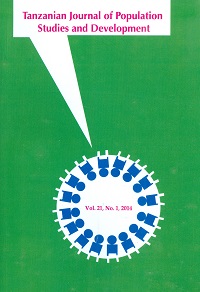An Analysis of Gender Based Participation In the Context of Participatory Development Approaches: The Case of Community Development Projects in Kongwa District, Dodoma, Tanzania
Abstract
Bottom-up development approach has fostered greater emphasis on the current popularly accepted participatory methodologies as an important development strategy tool. Institutionalisation of participatory rural appraisal and, opportunities and obstacle to development methodology underscore the importance of participatory approaches. This paper analysed gender participation basing on the conflicting interests and differences in some of the projects executed through participatory development approaches. The study randomly interviewed a sample of 100 respondents from two villages. It used questionnaires, checklist and Harvard analytical framework for data collection. Results showed that about 53% of the respondents did not understand the meaning of participation and participatory approach; and women laboured most in community development projects. Socio-cultural, participatory tool application, economic, and nature of the project were the factors found to influence major variation in gender participation. The paper recommends that participatory methodology and gender analytical framework be formalised by PRA activists to facilitate local leaders and the entire community in defining gender attribute, socio-cultural and economic differences prior to project execution. Planners should ensure that capacities and capacitating strategies, in terms of skills and resources to participatory development practitioner, are given priority. Also, policies should stipulate gender analytical components as a must criterion for project approval.
References
Akerkar, S. 2001. Gender and Participation: Overview report. [http://www.bridge.ids.ac.uk/ reports]. Site visited on 7/6/2007.
Apusigah, A.A. 2004. Gender, vulnerability and the politics of decision-making in Ghana: The case of the upper east region. Ghana Journal of Development Studies 1(2): 6-26.
Bailey, K.D. 1998. Method of Social Research. New York: The Free Press, Macmillan Inc.
Brett, E. A. 2003. Participation and Accountability in Development Management. [http://www.informaworld.com/] site visited on 14/4/2008.
Chambers, R. 2007. From PRA to PLA and Pluralism: Practice and theory. http://www.ids.ac.uk/ids/bookshop] site visited on 14/4/2008.
Cornwall, A. 2000a. Missing Men? Reflection on Men, Masculinities and GAD. IDS Bulletin. Vol 31, No. 2.
Ediriweera, I.V.W. 2005. Strategies adopted for sustained water supply and Government of Malawi and UNICEF. 1993. Situation Analysis report of Poverty in Malawi. Ministry of Women and Children, Malawi/UNICEF.
Goetz, A.M. 1997. Getting Institutions Right for Women. London: Zed Books.
Guijt, I., & Shah M.K. (eds). 1998. The Myth of Community, Gender Issues in Participatory Development, London: ITDG Publications.
Guijt, I., & A. Cornwall. 1995. Critical Reflections on the Practice of PRAs, Participatory Learning and Action Notes 24. IIED, London.
Kanji, N., & S. Salway. 2000. Promoting Equality between Women and Men. SD SCOPE Paper no. 2, Social Development Department, DFID. January.
Kothari, C.R. 1990. Research Methodology: Methods and Techniques. New Delhi: Wishwa Prakashan.
Mahimbo, H.K.L. 1985. In The theory and practice of popular participation in rural development planning in Tanzania. In K.J.B. Keregero et al. (eds.). Proceedings of Workshop on Popular Participation in Planning Rural Development, Morogoro, Tanzania.
Makusi, G.J. 1985. Implications of Tanzania ' s rural development policies on rural participation. In Keregero, K. J. B. et al. (eds), Proceedings of Workshop on Popular Participation in Planning Rural Development, pp. 97-109. Morogoro, Tanzania.
Muraleedharan, K. 2006. Participatory Development: Issues and Lessons. University of Calicut, Kerala, India. New Delhi: Serials Publications.
Mwaijonga, C.L. 1985. Policy Implications on Popular Participation and Rural Development. In: Keregero, K. J. B. et al., (eds) ibid.
Nabalarua, E. 2002. Pathways to Political Participation in Fiji: Gender, Race and Religion in Sustainable Community Development and Nation Building. Development Bulletin 59: 35-38.
Ndalama, M., & E. Kadzamira. 1997. Primary Community Schools Project. Baseline Study for Southern Region: Consolidated Final Report. DFID: Lilongwe.
Parpat (2000): Parpart, J. L. 2000. The Participatory Empowerment Approach to Gender and Development in Africa: Panacea or Illusion? Occasional paper presented during an Africa seminar at the Centre of African Studies, University of Copenhagen, on the 7th of November 2000. [http://www.teol.ku.dk/] site visited on 14th April 2008.
Rose, P. 2003a. Communities, gender and education: Evidence from Sub-Saharan Africa. Background Paper for 2003 UNESCO Global Monitoring Report. 21.
€”. 2003b. Community Participation in School Policy and Practice in Malawi: Balancing Local Knowledge, National Policies and International Agency Priorities. Compare 33(1): 47-64.
Samoff, J. 1990. Decentralization: The politics of interventionism. Development and Change 22: 513-530.
Seniloli, M., L. Taylor, & S. Fulivai. 2002. Gender issues in environmental sustainability and poverty reduction in the community: Social and community issues. Development Bulletin 58: 96-98.
Suda, C.A. 2000. Gender, culture and environmental conservation in western Kenya: Contextualizing Community Participation and the Choice of Techniques. Nordic Journal of African Studies 9(1): 31-48.
UNICEF. 1993. World ' s Women: Trend and Statistics. United Nations, New York.
URT. 1999. Tanzania Development Vision (2025. United Republic of Tanzania, Presidents Office, Planning Commission.
€”. 2000a. Poverty Reduction Strategy Paper. United Republic of Tanzania.
€”. 2000b. Tanzania Assistance Strategy. United Republic of Tanzania.
€”. 2002a. Tanzania Gender Development Policy. [http://www.tanzania.go.tz/] site visited on 4/3/2007.
€”. 2002b. Population and Housing Census. [http://www.tanzania.go.tz/census] site visited on 4/3/2007.
Wilkes, A. 2000. The Function of Participation in a Village Based Health Repayment. Scheme: What Can Participation Actually Do? IDS Bulletin 31(1): 31 €“36.


